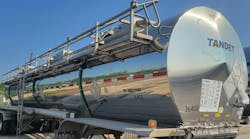It took dedication and hard work for Bulkmatic de Mexico to become the largest transload operator serving Mexico's plastics industry. The company has achieved impressive growth in just 11 years, and management has no intention of slowing up.
Recent developments include a new 300-railcar transloading facility on 10 hectares (24.7 acres) near Tula, Hidalgo, that can handle plastics and various hazardous materials. Another transloading site north of Monterrey, Nuevo Leon, just opened a new 60,000-sq-ft warehouse with state-of-the-art packaging capabilities. All together, Bulkmatic de Mexico now operates eight transloading terminals with total track capacity in excess of 1,000 railcars.
“System wide, we're processing more than 8,000 carloads of plastics annually,” says Jose Francisco Soto Perez, vice-president of Bulkmatic de Mexico. “We've put down five to six miles of new track at our transloading facilities over the past three years. We now have at least 20 miles of trackage across our entire system. Dispersed among our eight terminals are 88 high-cube, self-loading dry bulk trailers.
“We've significantly increased our warehousing and packaging capabilities. We're trying to capture more of the bagging activity currently done at the border. We can do it more efficiently, at a lower cost, and closer to the customer. Our new 60,000-sq-ft warehouse north of Monterrey has a bagging capacity of 1600 bags per hour, and we can fill 900 bags per hour at our Mexico City terminal. We're also adding bagging operations at our Guadalajara (Jalisco) terminal.”
Butch Bingham, Bulkmatic president, adds: “We're very happy with what we have achieved in Mexico. We expect Bulkmatic de Mexico to continue growing, and we are steadily expanding the range of cargoes we handle. For instance, we are doing more hazardous materials shipments. We've built a strong management team, and they are doing an outstanding job of identifying new opportunities.
“Even though we have competition in virtually every city we serve, we believe that Bulkmatic de Mexico will continue to thrive. We're an economical alternative to other transport options. Railroads account for about 20% of the freight transportation in Mexico, and trucks handle the overwhelming majority. Transloading brings the two modes together.”
Market growth
Soto adds that transloading activity is growing as the Mexico market evolves. The market used to favor bagged shipments of plastics, but new manufacturing operations are being designed to take advantage of the benefits offered by bulk shipments. The transload operator even assists some customers with silo installation to help promote the transition to bulk shipments.
Bulkmatic de Mexico is growing by about 30% a year on average, according to Soto. Most of that growth is being generated by plastics shipments, but the company is working aggressively to expand its range of transload cargoes.
“Our goal is to build a more diversified portfolio of cargoes,” he says. “On the dry bulk side, we're handling some flour and starch. We see considerable potential in liquid cargoes, including hazardous materials. We've targeted lubricants, vegetable oil, refrigerants, and some chemicals.
“Despite the diversification effort, plastics remain our primary focus. After all, that's what gave Bulkmatic de Mexico its start more than a decade ago. Demand for plastics continues to grow in Mexico, and domestic production can't keep up with the needs of the market. Most of the plastics we handle come from US chemical producers, but we've seen some product coming from Asia and the Middle East.”
Bulkmatic de Mexico wants to be a part of the transportation process no matter where the shipments originate for plastics and other bulk cargoes. “Containerized shipments from Asia and the Middle East are arriving at the ports of Manzanillo (Colima) and Veracruz (Veracruz), and we know we will see more of that in the future,” Soto says. “We've already handled some of the container shipments, and we have three tilt chassis just for that market. We'll add more container chassis as demand grows.”
Steady success
A division of Bulkmatic Transport Co in Griffith, Indiana, Bulkmatic de Mexico has come a long way since its launch in 1996. The operation started with a 20-car transload terminal in Monterrey and another small facility in Guadalajara.
More facilities were added in the following years, and all of them were expanded to keep up with growing demand. Along with the Monterrey, Guadalajara, and Tula facilities, Bulkmatic de Mexico has terminals in Mexico City; Queretaro, Queretaro; San Luis Potosi, San Luis Potosi; Hermosillo, Sonora; and Mazatlan, Sinaloa.
Truck transportation at most of those terminals is provided by Transportes Lopez e Hijos, a Monterrey-based trucking company that is one of the largest in Mexico. Transportes Lopez e Hijos has been the primary carrier since Bulkmatic de Mexico commenced operations.
“However, we have added Transportistas Unidos Mexicanos (TUM) as an additional carrier,” Soto says. “TUM hauls our dry bulk trailers at our transload terminals in Mazatlan and Hermisillo. In addition, the carrier provides van trailers for bagged shipments from our terminals in Monterrey and Mexico City.”
Tank trailers used for liquid cargoes are provided by Bulkmatic de Mexico's contract carriers or by customers. However, Bulkmatic de Mexico owns most of the trailers used for plastic pellets and other dry bulk cargoes. Built to handle Mexico's tough operating conditions, the transload operator's 88 self-loading Heil, J&L, and Polar bulkers have a 1,950-cu-ft capacity. Each trailer can haul a 66,000-lb payload. As part of Bulkmatic's system wide safety program, mechanics were to begin installing the StandFast fall protection system on the Mexico-based trailers before the end of 2007.
Trailers are cleaned after every change of product. Equipment assigned to the Monterrey transload location is cleaned at the nearby Transportes Lopez e Hijos terminal, but other transload facilities have their own tank wash systems. Cleaning equipment includes a pressure washer and a blower for drying trailers.
Short hauls
Eighty percent of the shipments handled by Bulkmatic de Mexico are delivered within 50 kilometers (30 miles) of the transload terminal. The remaining shipments generally don't exceed 250 kilometers (155 miles). “We're at our most cost effective and efficient when we stay within the 250-kilometer range,” Soto says.
Over the years, the Monterrey operation has emerged as Bulkmatic de Mexico's flagship location, and it runs 15 of the dry bulk trailers. One reason is the dynamic growth that has occurred in Monterrey and the surrounding region in the past decade.
“We have benefited from the fact that the Monterrey area is booming, as is much of northern Mexico,” Bingham says. “I see a new manufacturing plant every time I visit the area. It's great for us.”
The Monterrey-area operation grew dramatically and now occupies a 31-acre site near Salinas Victoria, about 40 kilometers (25 miles) north of Monterrey. Built in 2005, the terminal is served by the Kansas City Southern de Mexico railroad and can accommodate up to 270 railcars. Like all of the Bulkmatic de Mexico locations, the terminal has a scale for weighing shipments and is fenced and paved. Facilities operate around the clock and have 24-hour security.
The Monterrey terminal is the only one with its own switching engine for repositioning railcars. “We bought the engine used in the United States in 2006, and it gives us greater flexibility in serving our customers,” Soto says.
Monterrey terminal capabilities were significantly enhanced by completion of the new 60,000-sq-ft warehouse. The new warehouse, along with a nearby leased facility, gives the Monterrey transload operation total storage capacity of at least 90,000 square feet.
Services offered at the warehouses include high-speed bagging machines that can fill up to 1600 bags per hour. The warehouse also has palletizers.
“While Mexico's market is steadily shifting to bulk shipments of plastics and other products, the traditional market that relied on bagged product is still there,” Soto says. “With the packaging capabilities, we're getting a larger share of the traditional market.”
Terminal system
Packaging capabilities also are in place at the Mexico City transload terminal, which is about the same size as the Monterrey location. The terminal has 200 car spots and 70,000 square feet of warehousing.
During the first quarter of 2008, Bulkmatic de Mexico plans to add a bagging system to the 36,000-sq-ft warehouse at its terminal in Guadalajara. The terminal also can accommodate 80 railcars.
The new terminal near Tula has the largest railcar capacity (300) in the Bulkmatic de Mexico system. There are 120 carspots at the Queretaro terminal, 45 carspots in Hermosillo, 30 spots in San Luis Potosi, and 25 in Mazatlan.
All of the Bulkmatic de Mexico transload terminals have expansion capabilities. Soto and his management team leave no doubt that the terminals will grow as fast as necessary to keep pace with customer demand.








